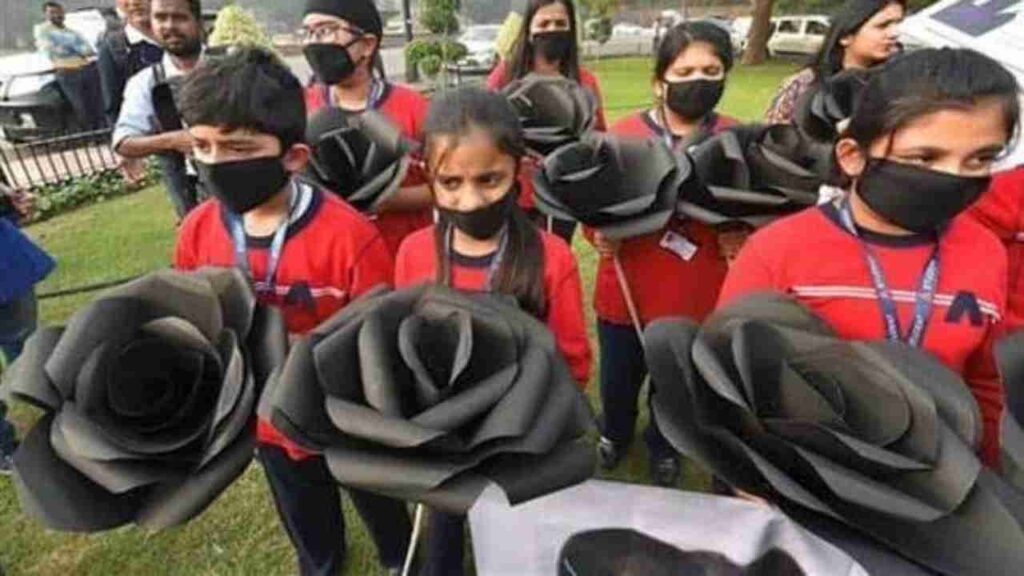Love’s Alternative : In the wake of February, the month traditionally adorned with the hues of love and affection, a unique celebration emerges for those who seek a different narrative – Anti-Valentine’s Week. Contrary to the romantic ambiance of Valentine’s Week, Anti-Valentine’s Week offers a lighthearted and symbolic approach for singles and those not keen on traditional expressions of love. Let’s delve into the details of each day, exploring the playful festivities that unfold after Valentine’s Day.
Love’s Alternative : Exploring the Quirky Path of Anti-Valentine’s Week

Slap Day – February 15:
On the inaugural day of Anti-Valentine’s Week, Slap Day on February 15 serves as a unique outlet for individuals to express remorse and grudges lingering from past relationships. This unconventional celebration provides a symbolic platform for letting out frustrations and acknowledging the mental distress caused by former partners. It’s not about physical actions but rather a metaphorical release of negative emotions.
This day symbolizes more than just a playful gesture; it’s a symbolic opportunity to move forward and liberate oneself from the weight of past grudges and frustrations. By acknowledging the need for a fresh start, Slap Day encourages participants to pave the way for a new chapter, unburdened by the shackles of unresolved emotions.
Kick Day – February 16:
On the second day of Anti-Valentine’s Week, Kick Day (February 16) aligns with the spirit of Slap Day but takes a different approach. Similar to its predecessor, Kick Day encourages individuals to expel remorseful feelings associated with any past love. However, this day emphasizes a metaphorical cleansing, symbolizing a decisive step towards a more positive future.
By kicking away negativity and bad memories, participants are invited to visualize a clean slate. Kick Day signifies the power to actively choose a more optimistic outlook, demonstrating that moving forward doesn’t just involve letting go but also embracing the potential for growth beyond past experiences.
Perfume Day – February 17:
Breaking away from the confrontational themes of Slap and Kick Days, Perfume Day on February 17 introduces a more introspective celebration. This day is a departure from expressing discontent with former partners, focusing instead on recognizing self-worth and indulging in self-pampering.
Perfume Day highlights the importance of self-love. The act of gifting oneself a perfume becomes a symbolic gesture of finding pleasure and happiness from within. This day encourages participants to celebrate their individuality and embrace the idea that personal contentment is not solely reliant on external factors.
Flirt Day – February 18:
As Anti-Valentine’s Week progresses, Flirt Day on February 18 takes a positive turn. Celebrated to encourage individuals to make newer and better choices in life, Flirt Day advocates for letting go of past apprehensions and embracing a more positive outlook.
This day serves as an occasion to express feelings to someone special, providing an opportunity for worthwhile and new experiences in life. Flirt Day is a lighthearted and playful celebration, inviting participants to explore the possibilities of new connections and experiences, unencumbered by the weight of past romantic entanglements.
Confession Day – February 19:
February 19 marks Confession Day, the fifth day of Anti-Valentine’s Week. On this day, participants are invited to confess their feelings, whether romantic or otherwise. This celebration is considered one of the best days to apologize and redeem oneself from any lingering feelings of guilt, fostering openness and honesty in relationships.
Confession Day provides a platform for individuals to express their emotions authentically, contributing to a healthier emotional environment. It underscores the importance of communication and vulnerability, recognizing that genuine connections are built on mutual understanding and acceptance.
Missing Day – February 20:
Known as Missing Day, February 20 offers a poignant moment within Anti-Valentine’s Week. On this day, participants express feelings of longing towards a special someone. It provides an opportunity to acknowledge and communicate emotions, whether it be a yearning for a past relationship or expressing sentiments of loneliness during Anti-Valentine’s Week.
Missing Day serves as a reminder that emotions, both positive and melancholic, are a natural part of the human experience. It encourages participants to embrace and express these emotions, fostering a sense of self-awareness and understanding.
Breakup Day – February 21:
The final day of Anti-Valentine’s Week, February 21, is aptly named Breakup Day. On this day, participants are encouraged to mark the opportune moment to end toxic relationships, symbolizing a decisive step towards personal well-being and growth. Breakup Day underscores the empowerment of individuals to sever demeaning bonds and choose freedom.
By providing a designated day for consciously ending toxic relationships, Breakup Day becomes a symbol of liberation. It encourages participants to prioritize their emotional and mental health, making it an empowering conclusion to Anti-Valentine’s Week celebrations.
Anti-Valentine’s Week(Love’s Alternative) 2024: 20 FAQs – Unraveling the Playful Celebrations
- What is Anti-Valentine’s Week?
- A playful counterpart to Valentine’s Week, dedicated to those who seek an alternative perspective on love.
- When does Slap Day occur?
- Slap Day falls on February 15, kicking off Anti-Valentine’s Week.
- What is the significance of Slap Day?
- Slap Day provides a platform to express remorse and grudges towards former partners symbolically.
- How does Kick Day follow Slap Day?
- Kick Day, on February 16, continues the theme of releasing remorseful feelings but emphasizes a metaphorical cleansing for a positive future.
- Tell me more about Perfume Day.
- Occurring on February 17, Perfume Day is a day for recognizing self-worth and pampering oneself with a symbolic gift.
- What is the aim of Flirt Day on February 18?
- Flirt Day encourages making newer and better choices in life, letting go of past apprehensions, and expressing feelings for someone special.
- What happens on Confession Day – February 19?
- Confession Day offers an opportunity to confess feelings, romantic or otherwise, and is considered a day for apologies and redemption.
- What is Missing Day about on February 20?
- Missing Day provides a platform to express feelings of longing toward a special someone, acknowledging various emotions during Anti-Valentine’s Week.
- Tell me more about Breakup Day on February 21.
- The final day of Anti-Valentine’s Week, Breakup Day, marks the opportune moment to end toxic relationships, symbolizing personal well-being and growth.
- How does Anti-Valentine’s Week celebrate self-love?
- Perfume Day and Flirt Day, among others, emphasize recognizing self-worth and making positive choices for oneself.
- Are these celebrations universally recognized?
- Anti-Valentine’s Week is more of a cultural or social trend and may not be universally recognized.
- Can I participate in Anti-Valentine’s Week if I’m in a happy relationship?
- Absolutely! It’s all in good fun, and individuals in happy relationships can join in with a playful spirit.
- How do these celebrations contribute to personal growth?
- Days like Kick Day and Breakup Day symbolize letting go of negativity, fostering personal growth and emotional well-being.
- Is Anti-Valentine’s Week only for singles?
- No, individuals in all relationship statuses can partake, as it focuses on diverse perspectives on love and self-discovery.
- Is there a specific way to celebrate these days?
- The celebrations are symbolic, so participants can choose creative, lighthearted ways to express the themes of each day.
- What’s the significance of gifting perfume on Perfume Day?
- Gifting perfume on Perfume Day is a symbolic act representing finding pleasure and happiness from within.
- Can Anti-Valentine’s Week be celebrated online?
- Absolutely! Participants can engage in virtual activities or share their thoughts and experiences on social media.
- Are there alternative names for Anti-Valentine’s Week?
- It is commonly known as Anti-Valentine’s Week, but some may refer to it as Singles Awareness Week or Breakup Week.
- How did Anti-Valentine’s Week originate?
- The exact origin is unclear, but it gained popularity as a playful alternative to traditional Valentine’s celebrations.
- What’s the message behind Anti-Valentine’s Week?
- It encourages a diverse exploration of love, self-discovery, and resilience beyond the traditional romantic narrative.
Conclusion: Love’s Alternative
As Anti-Valentine’s(Love’s Alternative) Week unfolds, each day offers a unique perspective on relationships, self-worth, and personal growth. From the symbolic gestures of Slap and Kick Days to the introspection of Perfume Day, the positivity of Flirt Day, the honesty of Confession Day, the emotionality of Missing Day, and the liberation of Breakup Day, this alternative celebration provides a nuanced exploration of love, self-discovery, and resilience. Whether participants engage in the festivities with a playful spirit or use it as a time for introspection, Anti-Valentine’s Week invites everyone to embrace a different facet of love—one that transcends the traditional romantic narrative.
ALSO READ : Valentine’s Day 2024 : A Celebration of Love and Connections















